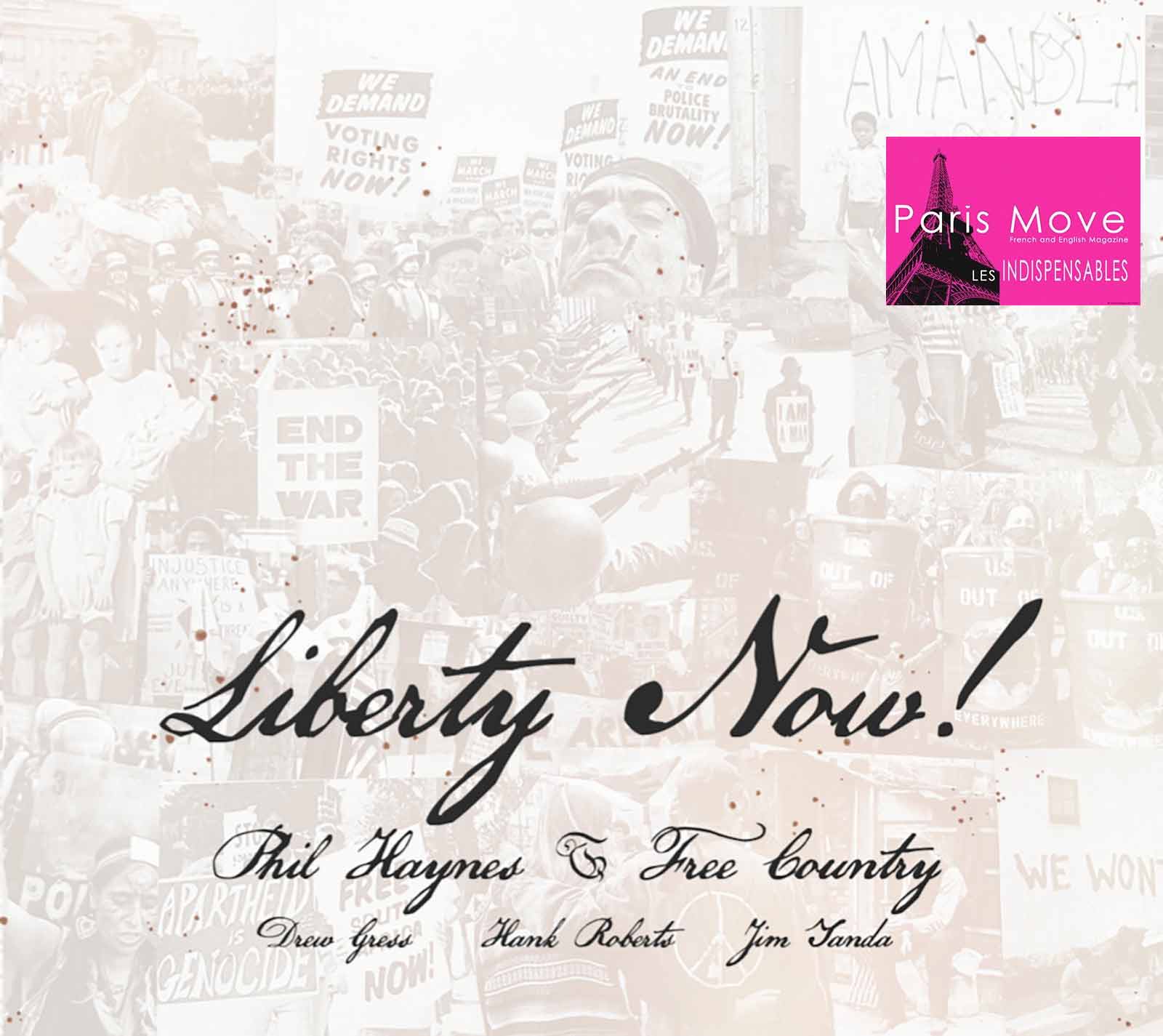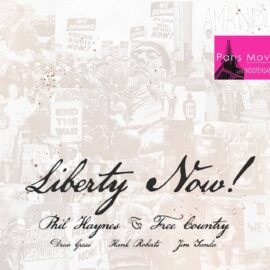| Jazz |

It has long been understood that jazz, like the blues and soul music, is never merely entertainment. It is argument, confession, resistance. Its very vocabulary,born of struggle, shaped by improvisation,has always carried political weight. At every critical juncture in American history, from the freedom songs of the civil rights era to the angry bursts of free jazz in the late ’60s, musicians have stepped forward to remind us that music is not immune from politics; it is, in many ways, politics by another means. In today’s fractured and restless moment, that connection feels unavoidable. What we are witnessing is a resurgence of projects in which artists reach into the bloodstream of American music to revive ideals some would prefer remain buried.
Into this landscape arrives Liberty Now!, a sprawling, deeply felt double album by drummer Phil Haynes and his longtime ensemble Free Country, featuring cellist and vocalist Hank Roberts, guitarist Jim Yanda, and bassist Drew Gress.
It is an album that does not shout but insists, that does not simply recall the past but reanimates it, binding together memory, protest, and personal loss into a singular statement. What is most striking, perhaps, is the durability of the bond between these musicians. Their collaboration spans nearly thirty years, and what emerges is not only virtuosity but a lived camaraderie,the sort that cannot be faked, only forged through decades of listening, playing, and enduring together.
Circumstance has shaped this record as much as intention. In December 2024, the group entered the studio with one plan, only to emerge with another. Their reunion, the first in more than a decade, had been announced under the title Our Music, meant as a retrospective of their original compositions after completing their historically and politically minded American Trilogy. But as the sessions began, two events intervened: the turbulence of the presidential election, and the sudden death of trumpeter Herb Robertson, a towering figure of creative music and a friend to the band. Robertson’s passing, arriving like a blow just as recording commenced, seems to hang over the sessions like a shadow, lending the performances a gravity that no rehearsal could have prepared.
The result is music that feels urgent, even combustible. From the very opening, Roberts’s cello, both solemn and lyrical, the listener is pulled not backward but deeper, into a dialogue between past and present. What might have been an exercise in nostalgia becomes, instead, a resurrection. Liberty Now! is haunted, yes, but also fiercely alive, determined to insist that freedom, musical, political, personal, is not a static inheritance but a perpetual struggle.
Haynes, who has long been one of the most sensitive and inventive percussionists of his generation, proves here that his artistry extends beyond technical brilliance. His drumming is conversational, always listening, always responding. He grounds the ensemble without ever constraining it, a presence both guiding and yielding. In interviews around the release, he admitted he had once thought Free Country had reached its natural conclusion. “After American Trilogy and our live album, I felt the group was finished,” he explains. “But the sound of Free Country and the alchemy we shared never left me. I asked myself what we might do if we returned, and the answer was clear: it had to be our own voices, our own compositions. When you bring together musicians who are not only great players but deeply personal composers, you end up writing and arranging in an entirely different way. The music becomes a collective act of authorship.”
That collective spirit animates the two discs, which unfold like a dialogue between protest and celebration. The first leans into confrontation, with a sharpness that reflects the times; the second opens into a kind of affirmation, a space for joy. Their interpretation of the Beatles’ “Revolution” serves as an anthem of insistence, while their luminous take on Marvin Gaye’s What’s Going On reminds us how much his voice is missed, and how urgently his questions remain with us. To their credit, the band does not attempt imitation. Roberts’s vocal approach is distinctly his own, layering vulnerability over authority, tenderness over insistence. The performance does not erase Gaye’s original but refracts it, insisting on its continued relevance while making space for new resonance. It is, in its own way, an act of homage and renewal.
One of the album’s pleasures is the way it allows us to travel, sonically, through decades. There are echoes of the 1970s, yes, but they are never treated as museum pieces. Instead, the music carries the past forward, placing it in dialogue with the present moment. That, in itself, is a statement: history is not something behind us but something we carry, whether we wish to or not.
To call Liberty Now! a political album would be accurate but insufficient. It is also deeply personal, even intimate. It is urban in spirit, shaped by the anxieties and aspirations of the city, but it is also philosophical, almost literary in its scope. What it offers is not resolution but reflection, a reminder that freedom is not a slogan but a living, fragile idea that requires constant tending.
There are moments of provocation, to be sure, but also of humor, even playfulness. At other points, the music turns heavy, burdened with grief. Like life itself, it resists a single mood, refusing to be smoothed into one continuous line. It is precisely in that unevenness, in its capacity to unsettle, then console, to amuse, then provoke, that the album finds its truth. Liberty Now! is less a polished monument than a living document, an invitation to join these musicians in the act of searching.
And perhaps that is its greatest achievement: not that it tells us what liberty is, but that it asks us to imagine it anew. By reinventing the music, these artists invite us to reinvent ourselves, to consider freedom not as a fixed inheritance but as a contested, ever-evolving practice. In that sense, Liberty Now! is more than a double album. It is a call to consciousness, a reminder that even in dark and unsettled times, art can hold open a space for hope, for resistance, for solidarity.
Thierry De Clemensat
Member at Jazz Journalists Association
USA correspondent for Paris-Move and ABS magazine
Editor in chief – Bayou Blue Radio, Bayou Blue News
PARIS-MOVE, September 2nd 2025
Follow PARIS-MOVE on X
::::::::::::::::::::::::
About this album:
CD I
Recorded December 13 + 14, 2024
Plus “Joy”, March 10, 2025
Electric Wilburland Studios, Newfield, NY
Recording by Matt Saucuccimarano
Edited & mixed by Matt Saucuccimarano
Mastered by Jon Rosenberg
Produced by Phil Haynes
Corner Store Jazz (CSJ-0151)
CD II
Jon Rosenberg
Recording, edit, mix & mastering artist
Tedesco Studios
Studio Masuo
Elk Creek Cafe & Alehouse
Bucknell University****
1996 – 2013
Produced by Phil Haynes
Executive producer, Christian Kvech (R.I.P.)
Corner Store Jazz (CSJ-0152)

